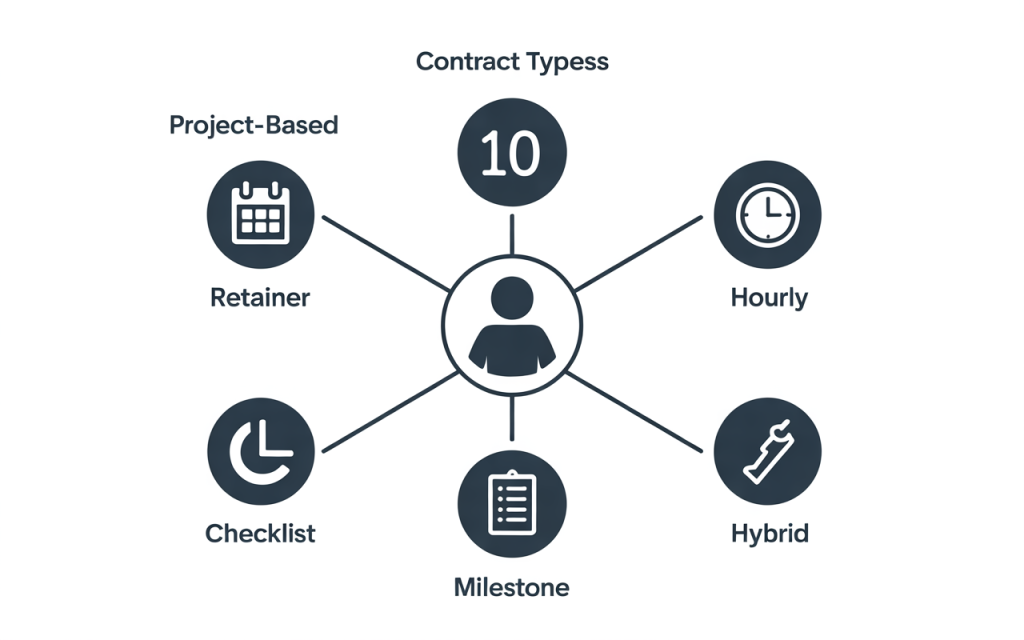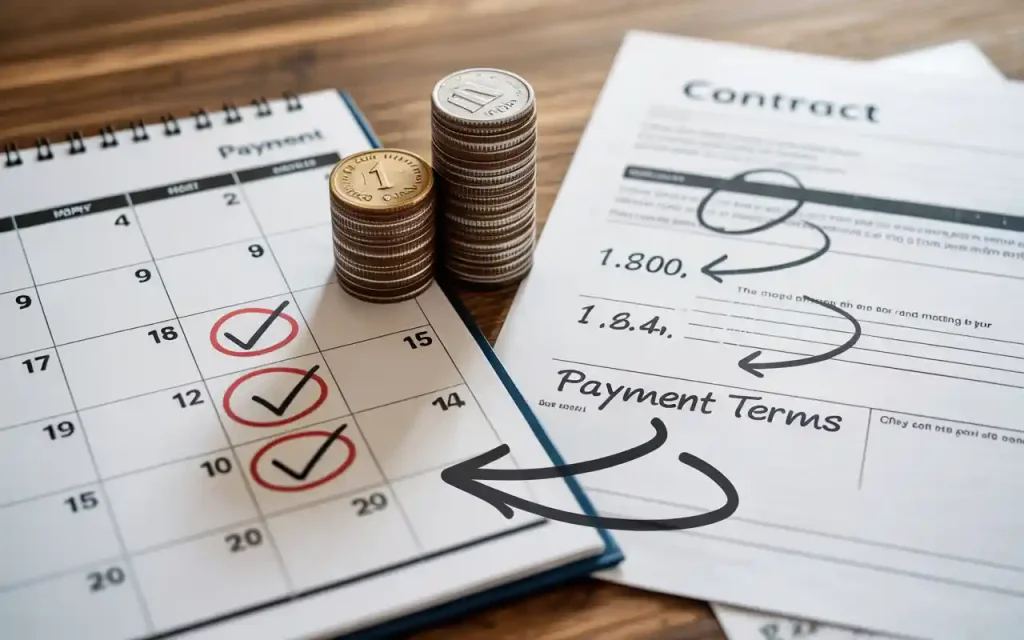Contracts 101: How to Avoid Getting Screwed in Freelancing

INTRODUCTION
A freelance contract is more than just a piece of paper—it’s your shield, your roadmap, and your safety net in the world of freelancing. As the freelance economy grows, more professionals are choosing the flexibility and independence that come with working for themselves. But with this freedom comes responsibility: you must protect your work, your income, and your reputation. That’s where a strong freelance contract comes in.
A freelance contract is a legally binding agreement between you and your client. It spells out exactly what work you’ll do, how much you’ll be paid, when you’ll deliver, and what happens if things go wrong. This clarity is essential for both new and experienced freelancers. Without a contract, you risk not getting paid, losing your rights to your own work, or facing endless disputes over project details.
Having a written contract is not just about legal protection—it’s about professionalism. It shows clients you take your business seriously and expect the same in return. A well-drafted contract helps prevent misunderstandings, sets clear expectations, and builds trust from the very start. It also gives you the confidence to negotiate better terms, manage changes, and handle any issues that arise during the project.

In Nigeria and around the world, freelance contracts are especially important because they provide a clear record of your agreement. This is crucial if you ever need to prove what was agreed in case of a dispute. Contracts also help you manage multiple clients, keep track of deadlines, and ensure you get paid on time. They can cover everything from intellectual property rights to confidentiality, payment schedules, revision policies, and more.
Whether you’re working on a one-time project or building long-term client relationships, a freelance contract is your best tool for success. It’s not just about avoiding problems—it’s about setting yourself up for a smooth, professional, and rewarding freelance journey.
What Is a Freelance Contract?

A freelance contract is a legally binding written agreement between you and your client. It clearly outlines the work to be done, payment terms, deadlines, rights, and responsibilities of both parties. This clarity helps prevent misunderstandings and protects both sides.
Types of Freelance Contracts

- Project-Based Contracts: For one-time projects with specific deliverables and deadlines.
- Retainer Contracts: For ongoing work, paid on a regular schedule (monthly, quarterly).
- Hourly Contracts: Billing based on hours worked, often with time-tracking.
- Milestone Contracts: Large projects divided into phases, with payments tied to milestones.
- Fixed-Price Contracts: A set price for the entire project regardless of hours worked.
- Hybrid Contracts: Combining elements of hourly and fixed-price agreements.
Why Written Contracts Matter
- They are legally enforceable.
- Provide clear evidence in case of disputes.
- Help both parties remember agreed terms.
- Build professionalism and trust.
Why Use a Freelance Contract?
Using a freelance contract offers multiple protections:
- Defines your work scope and payment terms clearly.
- Sets deadlines and project milestones.
- Explains consequences if either party breaches the agreement.
- Provides legal proof if disputes arise.
- Builds trust and professionalism with clients.
- Prevents scope creep (extra work without extra pay).
- Protects your intellectual property and creative rights.
- Clarifies confidentiality and data protection obligations.
Freelance Contract Basics You Must Know
Key Clauses Every Freelance Contract Should Have
| Clause | What It Covers | Why It Matters | Example Wording |
|---|---|---|---|
| Scope of Work | Tasks, deliverables, timeline | Prevents misunderstandings about project scope | “Design a 5-page website, deliver by August 1st” |
| Payment Terms | Amount, schedule, method, late fees | Ensures timely and fair payment | “50% upfront, 50% on delivery; $25 late fee after 7 days” |
| Intellectual Property Rights | Ownership and usage rights of work | Protects your creative output | “Client owns final files after full payment” |
| Confidentiality | Handling of sensitive client information | Builds trust and protects privacy | “Do not share client data with third parties” |
| Revision Policy | Number of included revisions and cost for extras | Prevents endless unpaid changes | “2 rounds of revisions included, $50 per extra round” |
| Termination Clause | Conditions for ending the contract | Clarifies exit process and protects both parties | “Either party may terminate with 7 days’ notice” |
| Dispute Resolution | How conflicts will be resolved | Saves time and money in disputes | “Disputes resolved by mediation in Lagos” |
| Indemnification | Liability for damages or claims | Protects you from legal responsibility | “Client responsible for use of delivered materials” |
| Non-Compete/Non-Solicitation | Restrictions on working with competitors or soliciting clients | Protects your business relationships | “No work for direct competitors for 6 months” |
| Force Majeure | Handling of uncontrollable events (natural disasters, pandemics) | Protects both parties from liability due to unforeseen events | “Neither party liable for delays due to force majeure events” |
| Portfolio Rights | Your right to showcase work in your portfolio | Helps you market your skills | “Designer may display work in personal portfolio after launch” |
| Payment Method | Accepted payment methods | Avoids payment delays | “Payments via bank transfer to provided account” |
| Expenses and Reimbursements | Responsibility for extra costs (travel, materials) | Prevents disputes over additional expenses | “Client reimburses pre-approved expenses with receipts” |
| Subcontracting | Permission to hire others for help | Clarifies delegation rights | “Freelancer may subcontract with client approval” |
| Deliverables Format | Format in which work will be delivered | Ensures client receives usable files | “Final files delivered in PDF and PSD formats” |
| Feedback Timeline | Time allowed for client feedback | Keeps project on schedule | “Client must provide feedback within 3 business days” |
Freelance Contract Payment Terms Explained

- Flat Fee or Hourly Rate: Specify if charging per project or per hour.
Example: “Project fee: $1,000” or “Hourly rate: $50/hour.” - Payment Schedule: Define payment milestones (e.g., 30% upfront, 40% mid-project, 30% on completion).
- Late Fees: Include penalties for late payments to encourage timely payment.
Example: “$25 late fee for payments over 7 days late.” - Deposit: Require a deposit before starting work to secure your time.
Example: “Work begins after 30% deposit is received.” - Invoicing: Specify when and how invoices will be sent.
Example: “Invoices sent on the 1st and 15th of each month.” - Currency: Clarify the currency for payment, especially for international clients.
- Refund Policy: State conditions under which refunds are allowed or denied.
Example Payment Terms
| Payment Term | Description | Example Clause |
|---|---|---|
| Upfront Deposit | Amount paid before work starts | “30% deposit required before project begins” |
| Milestone Payments | Payments at set project stages | “25% after first draft, 25% on final delivery” |
| Final Payment | Balance due on completion | “Final 50% due upon delivery of all files” |
| Late Fees | Penalty for overdue payments | “$25 fee for payments over 7 days late” |
| Refunds | When refunds are allowed | “No refunds after work has started” |
| Payment Method | How payment is made | “Bank transfer or PayPal only” |
| Currency | Which currency is used | “All payments in US Dollars” |
Freelance Contract Intellectual Property and Confidentiality

Intellectual Property (IP)
- Ownership Transfer: Client usually owns the work only after full payment.
- Usage Rights: Define permitted uses (commercial, personal, exclusive, non-exclusive).
- Retaining Rights: You may keep rights to showcase work in your portfolio.
- Third-Party Materials: Clarify responsibility for licensing fonts, images, or software.
Confidentiality
- Definition: What information is confidential (client data, project details).
- Obligations: How confidential info must be handled and protected.
- Duration: Length of confidentiality obligation (e.g., 2 years post-project).
- Consequences: Penalties for breaches of confidentiality.
Example IP and Confidentiality
| Clause | What It Covers | Example Clause |
|---|---|---|
| IP Transfer | When client owns the work | “Client owns IP after full payment is received” |
| Usage Rights | How client can use the work | “Work may be used for commercial purposes only” |
| Portfolio Rights | Your right to showcase work | “Freelancer may display work in portfolio” |
| Third-Party Assets | Licensing of images, fonts, etc. | “Client responsible for licensing third-party assets” |
| Confidentiality | Keeping info private | “Do not share project details with others” |
| Duration | How long confidentiality lasts | “Obligation lasts for 2 years after project ends” |
Freelance Contract Cancellation and Revision Rules

Cancellation Policy
- Notice Period: How much notice is required to cancel (e.g., 7 days).
- Fees: Any fees for early cancellation.
- Refunds: Whether deposits are refundable.
- Work Completed: Payment for work done before cancellation.
Revision Policy
- Included Revisions: Number of free revisions (e.g., 2 rounds).
- Extra Revisions: Cost for additional changes.
- Revision Timeline: Deadline for requesting revisions.
Example Cancellation and Revision
| Policy | What It Covers | Example Clause |
|---|---|---|
| Notice Period | How much notice to cancel | “7 days’ written notice required” |
| Cancellation Fee | Fee for early cancellation | “Client pays for work completed up to cancellation” |
| Refunds | If deposit is refundable | “Deposit is non-refundable after work starts” |
| Included Revisions | Number of free changes | “2 rounds of revisions included” |
| Extra Revisions | Cost for extra changes | “$50 per additional revision” |
| Revision Deadline | Time to request changes | “Client must request changes within 5 days” |
Freelance Contract Dispute Resolution
- Dispute Resolution Clause: Choose mediation, arbitration, or court.
- Jurisdiction: Specify which laws govern the contract.
- Costs: Clarify who pays legal fees if disputes escalate.
Example Dispute Resolution
| Clause | What It Covers | Example Clause |
|---|---|---|
| Mediation | Informal dispute resolution | “Disputes resolved by mediation before court” |
| Arbitration | Neutral third-party resolution | “If mediation fails, disputes go to arbitration” |
| Jurisdiction | Governing law | “Contract governed by laws of Lagos, Nigeria” |
| Legal Fees | Responsibility for legal costs | “Each party pays their own legal fees” |
How to Negotiate a Freelance Contract

- Know Your Worth: Research market rates and set confident pricing.
- Be Clear About Your Terms: Identify non-negotiables like payment and deadlines.
- Take Your Time: Review every clause carefully; ask questions.
- Be Flexible, But Firm: Accept reasonable changes but avoid unfair terms.
- Get Everything in Writing: Never rely on verbal agreements.
- Ask for Examples: Request sample contracts if unsure.
- Use Simple Language: Avoid legal jargon for clarity.
Common Mistakes in Freelance Contracts
- Using generic contracts without customization.
- Omitting key details like scope, payment, or deadlines.
- Relying on verbal agreements.
- Not updating contracts for new projects.
- Ignoring cancellation and dispute procedures.
- Avoiding e-signatures for remote work.
- Overlooking local legal requirements.
- Failing to specify timelines for deliverables and feedback.
- Not addressing client unresponsiveness.
Tips to Avoid Getting Screwed in Freelancing

- Always use a freelance contract before starting work.
- Read contracts carefully and ask questions.
- Keep signed copies of contracts.
- Never start work without a signed contract.
- Use simple, clear language.
- Be explicit about your rights and payment.
- Update contracts for each new client or project.
- Protect your intellectual property and confidential info.
- Set clear revision, cancellation, and dispute rules.
- Use e-signature tools for secure signing.
- Keep all communication documented.
- Set reminders for payments and feedback deadlines.
Sample Freelance Contract Structure
- Introduction: Parties’ names and contact info.
- Scope of Work: Detailed description of services and timeline.
- Payment Terms: Rates, schedule, deposits, and late fees.
- Intellectual Property: Ownership and rights transfer.
- Confidentiality: Privacy obligations.
- Revision Policy: Included and extra revisions.
- Termination Clause: Ending the contract.
- Dispute Resolution: Handling conflicts.
- Portfolio Rights: Showcasing work.
- Expenses and Reimbursements: Extra costs.
- Subcontracting: Delegation permissions.
- Signatures: Both parties sign and date.
Advanced Tips for Freelance Contracts
- Automate Invoicing: Use software to send invoices and reminders.
- Set Up Escrow Payments: Use platforms that hold funds until delivery.
- Add a Kill Fee: Compensation if a project is canceled after starting.
- Specify Communication Channels: Agree on email, Slack, or other tools.
- Include a Non-Disparagement Clause: Prevent negative public statements.
- Regularly Review Contracts: Update templates to reflect legal changes and best practices.
- Use Clear Definitions: Define key terms to avoid ambiguity.
- Include a Severability Clause: Ensures contract remains valid if part is invalidated.
- Add a Warranty Clause: Define guarantees about your work quality.
- Consider Insurance: Professional liability insurance can protect against claims.
Frequently Asked Questions (FAQs)

1. What is a freelance contract and why do I need one?
A freelance contract is a written agreement between a freelancer and a client that outlines the scope of work, payment terms, deadlines, and other important details. It protects both parties by setting clear expectations and providing legal backing if disputes arise.
2. What should be included in a freelance contract?
Key elements include the names and contact details of both parties, a detailed description of the work, payment terms, deadlines, intellectual property rights, confidentiality clauses, revision policies, and termination conditions.
3. When should I use a freelance contract?
You should use a contract for every freelance project, no matter how small. This applies to one-time gigs, ongoing work, and even projects with friends or family. A contract ensures everyone is on the same page from the start.
4. How can I make sure I get paid on time?
Include clear payment terms in your contract, such as due dates, late fees, and preferred payment methods. You can also request a deposit before starting work or use milestone payments for larger projects.
5. What happens if a client wants to change the project scope?
Your contract should include a clause about handling changes or “scope creep.” Specify how additional work will be charged and require written agreement for any changes to the original terms.
6. Who owns the work I create as a freelancer?
Ownership depends on your contract. Usually, the freelancer owns the work until full payment is received. After payment, rights can be transferred to the client, or you may license the work for specific uses.
7. What should I do if a client breaches the contract?
First, try to resolve the issue through direct communication. If that fails, send a formal notice referencing the contract terms. As a last resort, consider legal action or reclaiming your work if payment hasn’t been received.
8. Are freelance contracts legally binding in Nigeria?
Yes, freelance contracts are legally binding in Nigeria as long as they meet basic legal requirements: offer and acceptance, consideration (payment), capacity, and intention to create legal relations. Having a signed, written contract is the best way to protect your rights.
Conclusion
A strong freelance contract is your best defense against freelancing problems. It ensures fair payment, protects your work, and builds client trust. Use this detailed guide to write clear, comprehensive contracts and avoid getting screwed in your freelance career.




